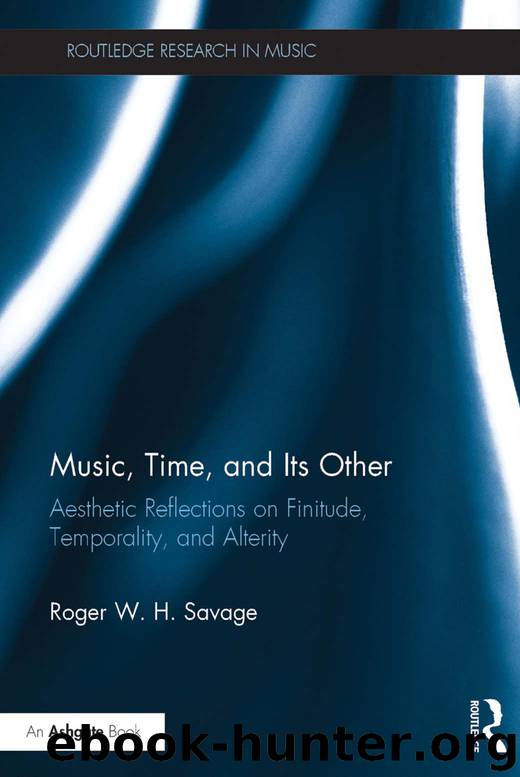Music, Time, and Its Other: Aesthetic Reflections on Finitude, Temporality, and Alterity (Routledge Research in Music) by Savage Roger W. H

Author:Savage, Roger W. H. [Savage, Roger W. H.]
Language: eng
Format: azw3
Publisher: Taylor and Francis
Published: 2017-09-12T16:00:00+00:00
Example 4.2 Arnold Schoenberg, Erwartung, mm. 411–413.
Source: Arnold Schönberg “Erwartung|Monodram in 1 Akt|für Sopran und Orchester|op. 17” © Copyright 1916, 1950 by Universal Edition A.G., Wien/UE 13612 www.universaledition.com.
Adorno’s criticism of the second-rate Expressionism from which Erwartung suffers, for him, due to its connection with Pappenheim’s text, reveals more about Adorno’s critical intransigence than it does about Erwartung in this regard. By turning the work’s figuration of dissonance into the “technical law of music’s form,”69 Adorno effectively subordinates the work’s expressive features to modern music’s negative dialectical raison d’être. In Adorno’s view, Schoenberg forces his music to repeat its expressive gestures through drawing its inner form from Pappenheim’s text and by adapting his music to it. By violating the “postulate of incessant innovation,”70 Erwartung thus ostensibly betrays its own ideal. Adorno admits that sustaining the shock of the new at every instant presents an impossible task so that the “utopia of the pure τóδε τι [a separate individuated substance]”71 is constantly beyond reach. At the same time, the formal technical law that he champions becomes hostage to the only philosophy that he believed could be practiced responsibly in the face of despair in order to contemplate “all things as they would present themselves from the standpoint of redemption.”72
As the hibernatory refuge of truth, music’s and art’s emphatic negation of meaning consequently remonstrates against the existing order of material life without for all that being able to offer any alternative. This hibernatory refuge is the vanishing point of modern music’s and art’s claim to truth—hence, their melancholic condition. According to Adorno, the liquidation of all stylistic conventions reduces expression to the immediate locus of its own absolute impulse. Yet works speak only by gathering these impulses together. The notion that “[t]otal contradiction is nothing but the manifested untruth of total identification”73 foregoes the fact that a work’s subversion of ideologically congealed systems and habits of thought is one that the work effects by virtue of its worlding power. Modern music’s and art’s melancholic condition is therefore in the end symptomatic of the performative contradiction that inheres in the radical negation of a style of philosophizing that dares to master the meaning of every present through grasping time in its totality in an eternal present. Contrariwise, in answer to the negation of tonality’s regulative order, and in contradistinction to Adorno’s assessment, Erwartung’s expression of anxious foreboding has the force of an event comparable to the one brought about by the Hegelian philosophy of history’s loss of credibility.
Download
This site does not store any files on its server. We only index and link to content provided by other sites. Please contact the content providers to delete copyright contents if any and email us, we'll remove relevant links or contents immediately.
The Goal (Off-Campus #4) by Elle Kennedy(13657)
Kathy Andrews Collection by Kathy Andrews(11812)
Diary of a Player by Brad Paisley(7559)
Assassin’s Fate by Robin Hobb(6199)
What Does This Button Do? by Bruce Dickinson(6195)
Big Little Lies by Liane Moriarty(5790)
Altered Sensations by David Pantalony(5093)
Pale Blue Dot by Carl Sagan(4996)
Sticky Fingers by Joe Hagan(4188)
The Death of the Heart by Elizabeth Bowen(3608)
The Heroin Diaries by Nikki Sixx(3543)
Confessions of a Video Vixen by Karrine Steffans(3301)
Beneath These Shadows by Meghan March(3300)
How Music Works by David Byrne(3259)
The Help by Kathryn Stockett(3139)
Jam by Jam (epub)(3072)
Harry Potter 4 - Harry Potter and The Goblet of Fire by J.K.Rowling(3058)
Computational Linguistics and Intelligent Text Processing: 20th International Conference, CICLing 2019 La Rochelle, France, April 7â13, 2019 Revised Selected Papers, Part I by Alexander Gelbukh(2981)
Strange Fascination: David Bowie: The Definitive Story by David Buckley(2857)
